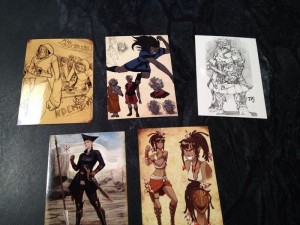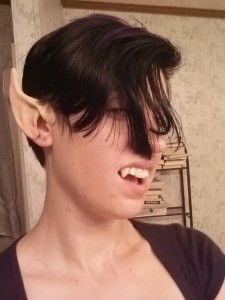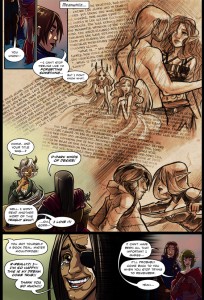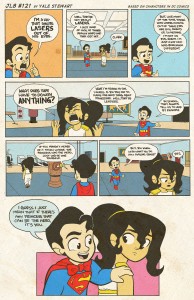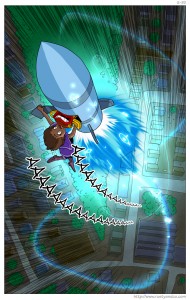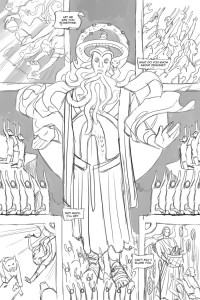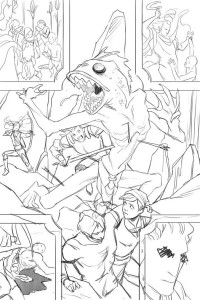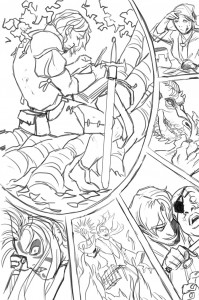I sometimes wonder if my writing will forever be trapped in that rebellious teenage phase.
When I first started writing Tome of the Undergates, it was in direct response to a rough draft that I had begun penning when I was fourteen, which was influenced largely by the books I was reading at the time.
Hence, there were a lot of words like “hero,” “good,” “evil,” “dark master” and I think once I actually unironically wrote “nefarious fiend” being thrown around.
You know the kind of story I’m talking about. The sanitized, bloodless, swooning-damsels, muscular-men with hearts of gold because that’s what they do versus the ugly, weird orc-like things that are totally ugly and gross and stuff.
I gather that, from all the discussion we’ve had about grittiness lately (and no, we’re not going to talk about that here…much), a lot of people were reading the same books as me. Hence, when I wrote Tome of the Undergates to feature a lot of unpleasant people doing exceedingly bloody things that bordered on bastarddom, I was pretty pleased with myself.
But now that your average hero in fantasy tends to be an asshole of one kind or another…I don’t know. I guess I’m getting a little bored?
Don’t get me wrong, I can see why we went down that road. Beyond just rejecting the idea of white hats and black hats, we were interested in seeing what makes bad guys tick. It was fun and unique to find out what makes these wicked people do what they do, because up until then, we’ve kind of taken it at face value that bad guys will do bad because they are bad and good guys will do good because they are good.
And it’s paid off. We’ve come very far in understanding more about the former. And yet, I can’t help but think we might not have asked ourselves the same questions about the latter. And one of those questions now is…
Is there room for good ol’ fashioned good guys in fantasy?
Before you answer, let me do it for you: no. There is no room for good ol’ fashioned good guys in fantasy (emphasis mine). The traditional sanitary morally-irreproachable fantasies of your granddad’s day are dead and buried and should stay that way. There are a lot of reasons why, of course. They simplify all the morality and thought of a human being into an insulting stereotype. They carry with them a lot of negative and iffy connotations as pertains to the aforementioned swooning damsels and the “other” (orcs, goblins, anything that isn’t a hero vaguely based off a medieval European dude) as a villain. But for the purposes of this blog post, we’ll be talking about a sin they commit that has led to a slow decline of the “good guy” in fantasy.
They take good and evil as rote. And that makes them dull.
I’m sure I’ve mentioned my friend Carl before, but for those of you just tuning in, he’s equal parts friend, spiritual advisor and fellow nerd. Carl and I share a love of most video games and chief among them are RPGs. From Baldur’s Gate to Skyrim, Carl has had one character he prefers to play and it will always be the first character he makes in any RPG: the lawful good paladin. If there’s an option, he’ll always choose for nonviolence and making everyone happy. If there’s no paladin class, he’ll come as close as he can. If there’s no morality system, he’ll impose one on himself.
I can’t remember which game it was, precisely, that led to the conversation, but he was recounting an experience in which he pulled off the classic Lawful Good heist. He saved every innocent NPC there was right down to their puppies. He smote every last villain he knew to be wicked. He made all his companions happy, saved the day and brought about a mighty triumph for truth and goodness. For his troubles, he was awarded a sword of inestimable power.
And he sighed deeply and turned off the game in disappointment.
“Well, isn’t that sort of the course for video games?” I asked him. “You are given a task to complete, you do it, you get rewarded.”
“Yeah,” he replied. “If you’re the average adventurer. I was the good guy. If I’m doing it for the obvious reasons, then it’s not really interesting.”
And this, I think, is where we go wrong in writing good guys.
We live in a society where, basically, “good” is taken as the norm. In most situations, our parents bring us up with the same basic values: don’t hurt other people, think of other peoples’ needs, be generous, try not to be an asshole. Hence, we’ve sort of come to expect it as the default setting for most people (hence why we get dramatic variations of “I have lost faith in humanity” all over the internet whenever some dumbfuck does something awful in the world) and hence, we’ve kind of figured out all we care to know about it.
And a lot of that got translated into our early fantasy. This guy is the point of view character. He is like us. Hence, he is good. He tries not to hurt people, he isn’t an asshole, he thinks of other peoples’ needs. That’s just what he does.
If the point of writing is to help us figure out what it means to be human, then it’s a small wonder that we rejected that idea of good as the “default” setting and started figuring out what makes a person a bastard. We know what makes bad guys tick now, quite thoroughly.
But do we know what makes good guys tick? Have we honestly asked ourself why someone would choose non-violence? Have we honestly asked ourselves what makes someone give up everything for another person? Have we given the good guys the same moral scrutiny that we gave the bad guys?
Possibly. I’m certain you savvy readers out there could point me to a few examples.
But I’ve become more and more interested in exploring the idea. If we look at good as “default,” then obviously it’s boring. We didn’t put any thought into it. But if we look at good as a choice, as hard and difficult as any bastard’s decision, then it becomes more intriguing.
I guess it wasn’t until The Skybound Sea that I started exploring this in my own work more. But I wanted to make sure that the desire to do the “good” thing wasn’t the easy thing.
For Gariath, the decision to stick with his friends meant giving up the closest thing he would ever have to people like him.
For Dreadaeleon, the decision to give up power meant losing his one chance to be the hero he always wanted to be.
For Lenk and Kataria, the decision to cling together meant giving up their very identities.
I mean, it’s not like sacrifice, love, friendship, heroism and all those other happy snuggly things are subjects that inherently repulse people. We’ve seen some of our most timeless masterpieces of science fiction and fantasy penned with those themes in mind (Star Wars comes to mind. The good ones, anyway). Every kid grows up wanting to be a hero, after all, but for a very long time our understanding of what it means to be a hero didn’t grow out of that childlike phase.
What we rejected, when we tore away from the old fantasy, was the idea of a spotless hero. The idea that the world could be totally black and white wasn’t something we were very interested in because we knew the world didn’t work that way. And don’t get me wrong: I’m not advocating for a return to that at all. It was rejected for good reason. The idea of the hero as something pristine and flawless is stupid and boring.
But lately, it almost seems like we’re going the other way, where we measure worlds and people in shards and fragments: they are sharp and they hurt to touch, they are broken and the only way to tell the difference is whose pieces fell off in the biggest chunks.
When I think of a hero, I think of something cracked and dirty. Something that seems like it’ll never quite break, but it’s something that only someone who’s been with it a long time could love. Because they could point to each smudge, each crack, each break and recall how they got that scar.
I guess the best example of this would Locke Lamora from Scott Lynch’s Gentleman Bastard series. He’s not what you’d call a classically good guy. I mean, he’s a thief. He robs people, deceives them and he is fairly unrepentant about it. But he sacrifices, he puts other people over himself (not everyone, mind you) and generally is willing to go beyond the typical pettiness.
Perhaps if we stop treating it as rote, as routine, as default, the idea of “good guys” doesn’t seem so boring. Perhaps if we understand how painful it is to give up something, how heartwrenching it is to let something go for what you know is right, how beautiful love can be if the world burns for it, then maybe it’s worth talking about?
I mean, I don’t know. Part of my general desire to rebel against establishment means I’m not always going to reflect what the readers, as a whole, want. Maybe I’m deluding myself. Maybe there isn’t a way to portray that idea of “good” as interesting.
But I can’t help but wonder. If Tome of the Undergates, in all its bloody glory, was a rejection of the stuff I used to read, there must have been a reason it appealed to me in the first place. Even if I outgrew the presentation of goodness, I never stopped being fascinated with the idea of it.
Maybe there’s still more to say about that.
